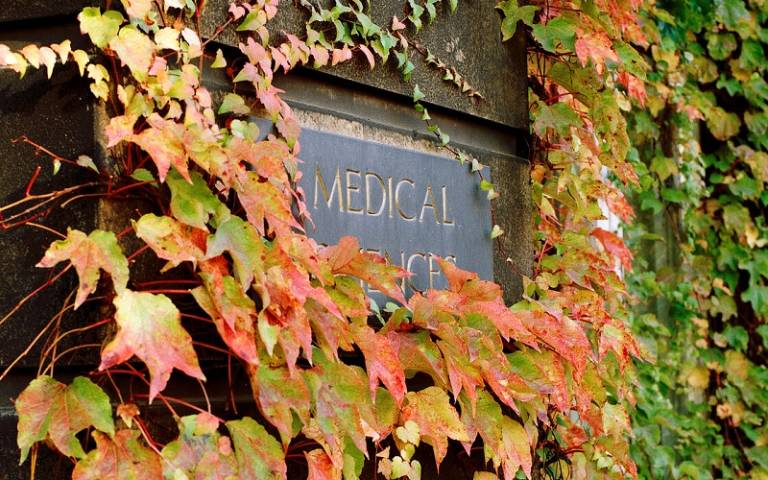How one patient-doctor journey gives hope to millions who suffer UTIs
Having been diagnosed with chronic urinary tract infection (UTI), one patient underwent years of treatment in the care of a UCL academic. Now, she is furthering his team’s work with a £1.7m endowment.

20 July 2023
Chronic urinary tract infection (UTI) is all too common. In fact, those three letters represent a host of infectious diseases that – counted together – are the most frequent to occur in women and elderly people.
What is less well known is how different varieties manifest: ‘ordinary’ infections (often those found in younger patients) are relatively treatable, while severe forms (more usual in later life) can consistently recur as well as prompting severe pain and debilitation.
If left untreated, UTIs can also have life-altering consequences for the individual – such as permanent kidney damage and urosepsis. And for the wider healthcare system, the prevalence of infections is a significant burden and a growing contributor to the development of antimicrobial resistance.
These pressing factors are driving the UCL Bladder Infection and Immunity Group (BIIG) – led by Drs Harry Horsley and Rajvinder Khasriya – to urgently seek to change how we understand, diagnose and treat UTIs.
A patient’s story
Upon being first diagnosed with a chronic UTI, one patient had little idea of how it would disrupt her life. Unfortunately, as the disease progressed it became clear that she would require near-constant treatment.
The serious nature of her condition led her path to cross with that of clinician Professor James Malone-Lee, an UCL academic with more than four decades’ experience and a profound influence on research and treatment of UTIs.
“My first impression as a patient meeting the Professor was a slightly eccentric, kind man, with a great sense of humour,” she said. “As time went by, I realised that here was a man who was deeply committed to his patients, students, and colleagues, which called at times for great professional courage and tenacity.”
Over time, her health gradually became more manageable – and when Prof Malone-Lee died after a short illness in 2022, his former patient was moved to commemorate the academic who had helped to transform her own quality of life.
The next generation
To do so, she decided to further the work of his colleagues – the Bladder Infection and Immunity Group (BIIG) team at UCL, as part of which Prof Malone-Lee carried out much of his innovative work in pharmacology, biomechanics and physiology.
She decided to allocate a £1.7m endowment to the creation of a four-year PhD studentship within the team, significantly expanding its research capacity and directly enhancing our ability to understand a range of urological conditions.
The PhD researcher’s work will form part of BIIG’s broader mission: to break away from the ‘one-size-fits-all’ approach to UTIs and respond to intrinsic differences in diagnosis technique and treatment, ensuring that patients have access to relief and that therapies stay a step ahead of bacterial resistance.
“Thousands of patients have benefitted from Professor Malone-Lee’s research, conducted over nearly 50 years. His resilience was astounding and his insistence to ‘follow the science’ remains at the heart of BIIG,” said Dr Rajvinder Khasriya, Consultant Urogynaecologist, Principal Clinical Investigator. “This unbelievably kind donation will ensure his legacy continues through the next generation of scientists.”
“Professor Malone-Lee often reminisced of the hardships of being a PhD student, including the huge personal and financial costs of making ends meet as a young doctor. He recognised the difficulties of academic life and shielded his students from this through his generosity,” said Dr Harry Horsley, Senior Research fellow, Principal Scientific Investigator.
“This fellowship, in the Professor’s name, will now protect a group of young talented researchers and gift them a chance to shine.”
In life, ‘Prof’ (as Malone-Lee became known) was hugely well-respected as a tutor and a mentor to upcoming clinicians and scientists, many of whom continue to build upon his work either as part of BIIG or the wider research sector.
“I would suggest that the best testimony to the Professor is the profound sense of loss and grief still felt by his team and many of his patients,” said the donor.
By creating a new four-year PhD within the group, her hope – and that of millions of people who suffer UTIs – is that his legacy can be every bit as influential as his long and distinguished career.
Read more
UCL Faculty of Medical Sciences
UCL Department of Renal Medicine
UCL Giving
 Close
Close

